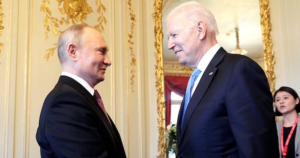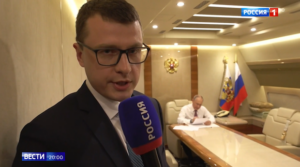
Putin meets Biden amid a frenzy of Russian propaganda

Nobody expected much from the Geneva summit between Russian President Vladimir Putin and his counterpart Joe Biden, and not much was delivered. None of the major disputes between Russia and the U.S. moved closer to a resolution, even though the talks apparently went well. But the summit was a very big event for Russian state media.
What did they talk about?
The main — indeed only — concrete decision to be taken at the meeting was apparently an agreement to return the two countries’ ambassadors to Washington and Moscow. The presidents also discussed an exchange of prisoners. And Biden handed Putin a list of 16 critical infrastructure objects that Russia must not attack – or the U.S. will respond in kind. Putin, as usual, said the U.S. was responsible for most of the world’s cyberattacks.
The two presidents discussed Ukraine but nothing new was announced. And Biden raised the question of political prisoners and the pressure on the Russian opposition, to which Putin responded that jailed opposition leader Alexei Navalny knew exactly what he was doing (although, as always, Putin did not utter Navalny’s name).
What does it mean?
All the political experts who spoke to The Bell said that the meeting went more or less as expected, and maybe a little better. Each president put on a performance that would play well at home: while Biden presented himself as a reasonable, professional politician who lectured Putin on human rights, Putin portrayed himself as a force with which to be reckoned and an important leader on the global stage.
What was the reaction in Russia?
Independent media outlets wrote relatively little about the summit, simply because much of it happened behind closed doors. But pro-Kremlin media took a different approach. “The leaders greeted each other cautiously, as if there was nothing for them to discuss. But we certainly have things to discuss!” – was one phrase from a presenter on state-owned Rossiya-24 that neatly summed up state media coverage.
Every last detail of the meeting was analyzed by state-controlled television. When Putin disembarked from his plane we were told he was obviously in an “energetic mood”. While Putin sat in an ‘open pose’, Biden was apparently ‘closed’ – and TV anchors desperately speculated what it might mean. And when Putin was positioned on the right for a photoshoot, some claimed that, according to the ‘language of protocol’, it meant Putin was in charge.
This all reached its apogee in a report on Rossiya-24 titled ‘Open Putin and Closed Biden: images you’ve never seen before’. Reporter Pavel Zarubin was given access to the holiest of holies: the presidential jet on its way to Geneva.

The report was delivered in a reverential tone: we saw Putin shuffling papers and making notes (“He didn’t sleep a wink on the four-hour flight, preparing for the meeting,” murmured Zarubin as he stood by the president’s desk). The camera picked out a rolled up tie: “the president will put it on when he leaves the plane,” Zarubin informed his viewers. Later, Zarubin made it to the villa where the summit took place and asked one of Putin’s aides a challenging question: “how are you feeling?”
Why the world should care: There is very little information on which to base any conclusions about the summit. But it’s easy to agree with Alexander Baunov, a senior fellow at the Carnegie Moscow Center, who said that Russia has finally given up pretending it is following a ‘Western’ path.




